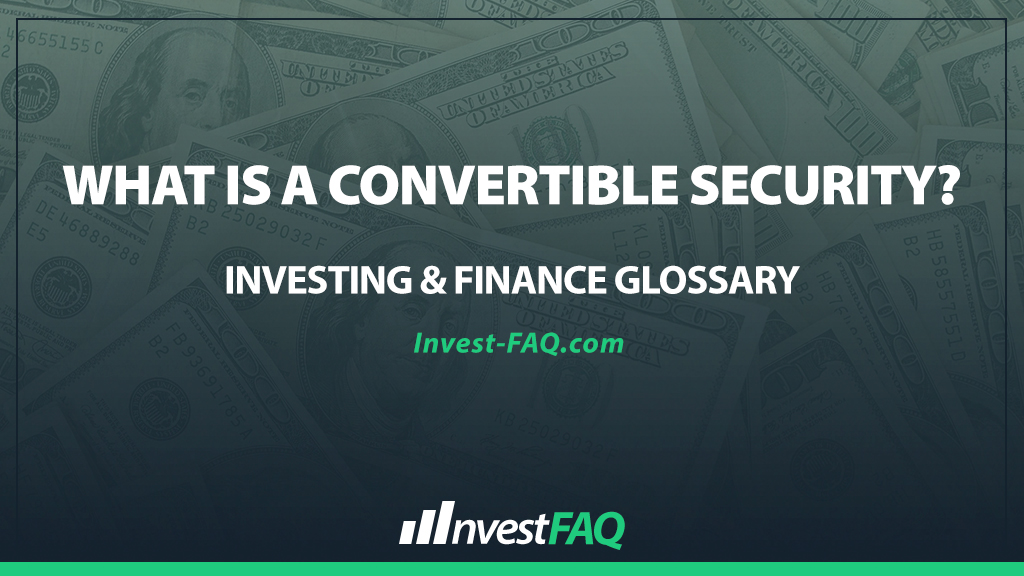
Convertible Security
Contents
A convertible security is a financial instrument, such as a bond or preferred stock, that can be converted into a specified number of another form, typically common stock, at the discretion of the holder or issuer under predetermined conditions. This hybrid nature offers investors the income and security of fixed-income securities with the potential for capital appreciation associated with equity investments.
Convertible securities are a flexible financing tool for businesses, serving both as a mechanism for raising capital and as an incentive for investors who seek the safety of bonds or preferred shares with the upside potential of equity.
They can be particularly appealing for companies looking to minimize interest costs or avoid the dilution of existing shareholders’ equity that comes from issuing new common stock.
Example of a Convertible Security
Suppose “Tech Innovations Inc.” issues convertible preferred shares with a face value of $100 each, paying an annual dividend of 5%, and convertible into 4 shares of common stock at the holder’s option.
If the market price of Tech Innovations’ common stock increases to $30 per share, the total market value of shares obtainable through conversion would be $120 (4 shares x $30), offering a more attractive option for investors than retaining the preferred shares with their fixed dividend.
In this example, the convertible preferred shares provide investors with a steady dividend income while also offering the potential for higher returns through conversion to common stock, should the company’s share price perform well.
For Tech Innovations Inc., this arrangement allows the company to secure capital at a lower cost than issuing common stock outright at the time of financing, while potentially delaying equity dilution until the conversion occurs.
Types and Uses in Business Scenarios
Convertible securities can be leveraged in various business scenarios, including:
Startup Financing: Young companies might issue convertible securities to attract investors while minimizing dilution.
Growth Capital: Established companies may use convertible bonds or preferred shares to finance expansion without the immediate burden of higher interest payments.
Employee Compensation: Convertible securities can be used as part of compensation packages, aligning employees’ interests with the company’s success.
The versatility of convertible securities makes them a valuable tool for strategic financing across different stages of a company’s lifecycle.
Significance for Investing & Finance
The accounting treatment of convertible securities involves several considerations:
Balance Sheet Presentation: Convertible securities are initially recorded based on their issuance price, typically as a liability (for bonds) or equity (for preferred stock).
Interest and Dividends: Periodic interest payments or dividends are expensed on the income statement, affecting the company’s net income.
Conversion: Upon conversion, the accounting treatment shifts, with convertible bonds transitioning from liabilities to equity, impacting the company’s debt-to-equity ratio and potentially diluting existing shareholders.
Convertible securities thus play a complex role in financial reporting, affecting a company’s financial statements and key metrics in several ways, from the cost of capital to equity structure.
In summary, convertible securities represent a strategic financing option that balances the needs of investors and issuers, offering a compromise between debt and equity.
Their unique characteristics and flexibility in terms of financing, combined with the specific accounting implications, make them an essential component of corporate finance and investment portfolios.
FAQ
What are the key benefits of investing in convertible securities for individuals?
Investing in convertible securities offers individuals the dual benefit of receiving regular interest or dividend payments while retaining the option to convert into common stock, potentially allowing for capital appreciation if the issuer’s share price increases.
How do convertible securities affect a company’s capital structure?
Convertible securities initially enter a company’s capital structure as either debt or preferred equity, but their conversion into common stock can alter the capital structure by increasing the company’s equity base and potentially diluting existing shareholders’ stakes.
What triggers the conversion of a convertible security into common stock?
The conversion of a convertible security into common stock is typically triggered by the holder’s choice, often influenced by the underlying common stock’s price exceeding a predetermined threshold that makes conversion financially beneficial.
Are there any risks associated with issuing convertible securities for a company?
While issuing convertible securities can lower immediate financing costs and minimize dilution, there is a risk of future dilution of equity if many securities are converted, and the company may need to manage the impact on its capital structure and shareholder value.
